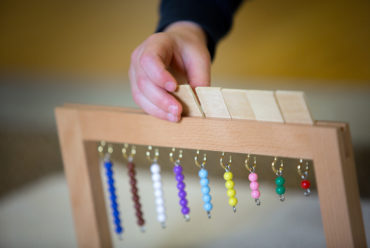Empathy: A True Lesson in the Montessori Classroom
 Having lived in five continents and in seven different countries, I have been able to conclude that the world is bigger than I could have ever truly imagined and that I was lucky to have been exposed to an array of unique cultures, vast human diversity, and traditions that define human identity. Through different lands, different languages and many miles traveled, I noticed one human quality that extends throughout the globe and connects humankind. Empathy.
Having lived in five continents and in seven different countries, I have been able to conclude that the world is bigger than I could have ever truly imagined and that I was lucky to have been exposed to an array of unique cultures, vast human diversity, and traditions that define human identity. Through different lands, different languages and many miles traveled, I noticed one human quality that extends throughout the globe and connects humankind. Empathy.
By definition, empathy is the ability to understand the feelings of another. Even as I felt like a true foreigner in many lands, it was clear that people wanted to help me, or saw me feel frustrated and different and they wanted to make me feel okay. Empathy is a learned human skill and not one we are born with, thus, it is extremely important that us teachers, and more importantly parents, introduce this life skill in early childhood to help build compassionate and kind human beings.
I see it happen every year. Young children walk through my classroom doors in early September, many of them displaying an egocentric personality. They have trouble using logic and accepting ideas other than their own. This is common in many young children as they are still working through the adaptation of many life skills simultaneously. At the same time, I have some returning students walking through those same doors that have a solid foundation in empathy introduction. They will be an integral part of our community as we work with our new students in developing this important skill. In every true Montessori environment, empathy is a skill we take very seriously, and us teachers preach and repeat it with much love, kindness, and care, until we start to see all the children, echo our words throughout the room.
Why is this skill so important you might ask? Because teaching empathy is an important part of a child’s social and emotional development. Empathetic children are willing to listening to their peers, have a better understanding of feeling and are open to compromise, while those that are still acquiring the skill might have more difficulty understanding the needs of others and maintain a solid stance of non-negotiation.
One of my duties as a Montessori educator is to make sure that every child leaves with the gift of empathy. There is nothing more beautiful than seeing a child comfort another, or hearing a child suggest to another they take turns so they are both happy, or admiring a child care for the sprouts growing in a pot because that child saw the process begin with a seed. That was the same child that walked through my classroom doors early September, displaying a very different attitude.
How do we teach empathy? There are many effective ways to teach empathy and I have shared some of my ideas below.
- Name the feeling. Teachers talk with the child about what feelings they are experiencing, what feelings are and give them names. “I see you are feeling sad/angry/happy/confused”. Giving a name to a feeling a child is displaying, is the first step in helping young children identify feelings.
- Define that feeling. “I see you are feeling sad. I can see and hear you are crying”.
- Offer a solution. “I see you are feeling angry. I can see and hear your angry words. I would like to help you feel happy again, let’s find a solution so you can get there”. Naming feelings is a good start to helping a child develop emotional empathy, and it will promote understanding of their feelings and how to cope with them.
So, what next?
We then tackle cognitive empathy, where we try to help a child or a community as a whole, understand that others are feeling. One day, one of my students was having a particularly hard time with separation anxiety. The child still joined us for community circle where I was attempting to show a new activity. However, the student was overtaken with emotions and tears. As I could not continue, we shifted our focus on the child that needed our help. I asked the children to remember that at one point, they had felt sad about their parents leaving, but that after a while they were able to calm down, feel better, and enjoy their day with their teachers and friends. Many children expressed their concern for their fellow peer and their words were so loving and supportive, that the student was able to calm down from the show of love and support. The children’s ability to step into their friend’s shoes for a short moment paved a path of for their constructive thought process and compassion for their friend. In the end, I was able to continue my lesson and my heart was filled with joy from the show of empathy expressed throughout the room.
Why is empathy so important? As stated in my introduction, empathy plays a big role in a child’s social and emotional development. A child developing empathy is also more likely to show compassion. A compassionate human being will always be more motivated to help others because they have a good balance of emotional and cognitive empathy. A very special moment I won’t forget, came a few months back when my mother left to go back to where she lived. I had told my students the day before that I felt sad because I had to take my mother to the airport, and I would not see her again for a long, long time. The next day, many of my students asked me how I was feeling, they drew me pictures, they gave me hugs, they did all their little 3 and 4-year-old bodies could do, to make me feel happy. I was overtaken with emotions because I saw, for a split moment, the power of empathy. I was relieved to see that all our hard work with empathy, of preaching and repeating with much love, kindness, and care, was helping build compassionate and kind human beings.
One thing that traveling has gifted me, apart from opening my eyes to this amazing world we live in, is empathy. And now, as a Montessori teacher, I have a very special duty that at times feels more important to me than teaching numbers and words to my students. I make it my duty to help every child that walks through my doors, leave with empathy in their hearts and being compassionate human beings.









No Comments